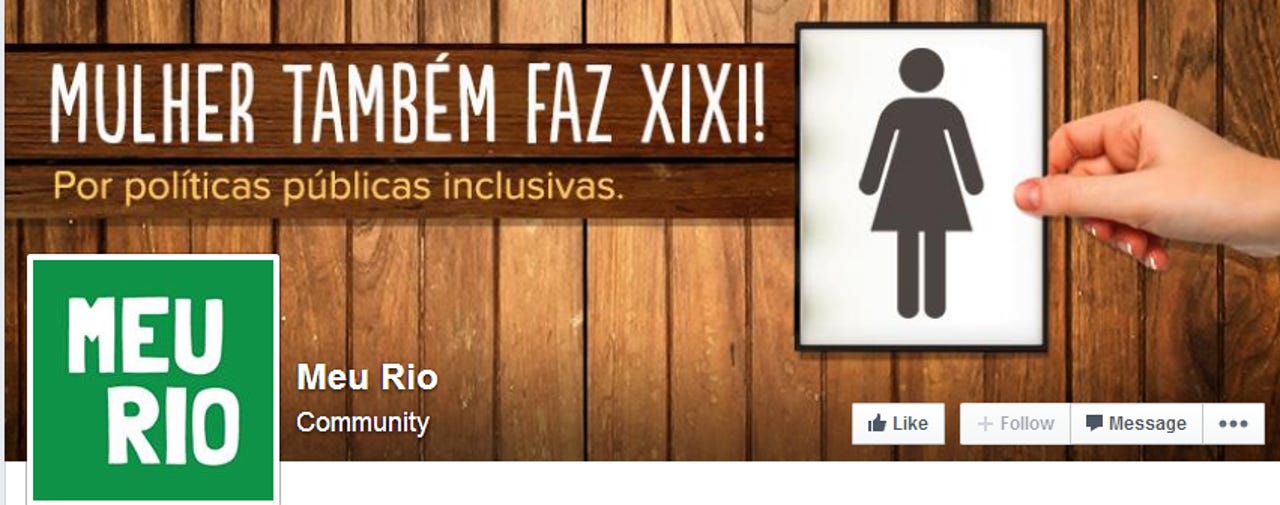A Brazilian app gives power to the people

RIO DE JANEIRO — Look beyond the postcards of Rio de Janeiro's beautiful coastline and you will see pot-holed roads, a failing public school system, uncollected rubbish and raw sewage regularly flooding the streets — and a population of six million who believe the politicians who should solve these problems are corrupt... and then shrug about it.
But their apathy — and the politicians — have had a serious wake-up call. A team calling themselves Meu Rio (or My Rio) are galvanizing residents, and using innovation to get results. They have a network of 140,000 online activists ready to be mobilized for campaigns, and apps to identify the right people to lobby and get the pressure on fast.
In December 2012, the teachers at the Friedenreich primary school got wind that their whole site was going to be bulldozed to make way for a soccer stadium car park. There was no consultation process, no vote in public, and no plan for the children. But without a demolition date, the parents didn't know how to get their protest together in time. Then Meu Rio received this letter:

"My name is Beatriz Ehlers, I'm 11, and when I grow up I want to be an architect... I love my school! It was here that I learned to read, write and respect other people. We urge all people of Rio to help us to keep our school from being demolished."
They "popcorned in" as they call it, and created the "On Guard" tool. They wired up a series of webcams covering the school gates, and rotated activists to watch the feed 24/7. Any sign of bulldozers, and the Guardian on watch was one click away from mobilising 1,500 campaigners to block their way. Together with off-line protests and media coverage, the mayor reversed the decision.
Twenty-seven-year-old Leona Deckelbaum is one of the twenty-strong Meu Rio organizer team. She joined after years working for some of the people she now campaigns against: a city government department selling its urban plans to communities.
Featured
"What got to me was how easily people just accepted their fate. I was thinking, 'Why aren't they getting mad at me? Why is nobody spitting on me?' They have no idea what their rights are and how to stand up for them."
Now she works on the ground, identifying issues and encouraging residents to use Meu Rio's key app: the "Pressure Cooker." By identifying the key points of the campaign, the technology generates a list of the right politicians to lobby, advises the campaigner on a way to make their case as clearly as possible and automatically sends the message for them.
Information about the new campaign is then circulated to the relevant part of the online network, using the website Mail Chimp to generate the email title most likely to appeal to that particular member — and they are in turn encouraged to send a message to the same politicians.
In a campaign against a construction bill, 7,000 letters and hundreds of calls went in to legislators within 24 hours.
"People are frustrated about how their city is working," says Deckelbaum, "but they don't know how to channel that. All we are doing is creating a dialogue between citizens and public power."
It's definitely got the politicians' attention. Since Meu Rio started, a rash of small-scale public engagement campaigns have emerged to show that the legislators are listening. But privately some grumble that Meu Rio is encouraging "arm-chair activism," a one-click petition on an issue they didn't care about until it dropped into their inbox. How many in the network do their homework on the pros as well as the cons of the issue before protesting about it?
But for Leandro Lima in Rio's biggest favela — or shanty town — Meu Rio gave his campaign focus. Unhappy with plans to invest hundreds of millions on a new cable car before funding sanitation projects, but unable to engage residents, he sought help.
"They brought experience and the research I needed to make my case — a cable car in another favela was only benefitting tourists not residents. They helped me explain this to residents, write digital letters and get the attention of the rest of the city."
Meu Rio's designers gave the campaign visibility; impact beyond the community. "Invest Here!" their stickers scream all over the city — stuck on open sewers and on uncollected rubbish. The group picked up the sanitation issue, starting a series of publicity stunts to highlight the statistic that 60 percent of the city's sewage is pumped untreated into the sea. The team took toilets onto the beach, swam with giant posters in the bay, and sprayed giant pictures of bacteria into the sand.
They support around 300 campaigns at a time, and claim a 20 percent victory rate. Their roster is about to grow. Google has just awarded the group $1 million over five years through its Impact Challenge, enough to expand into another 27 cities across Brazil.
"It's the same disasters happening everywhere," says Leona Deckelbaum. "And it's hard to make the smallest dents, but when we have success, those are the best days of my life."